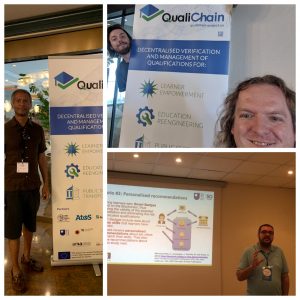News Story
KMi and QualiChain at ESWC and JTELSS 2019
Friday 14 Jun 2019
Last week, KMi members were in two flagship events, spreading the word about the QualiChain project. The Extended Semantic Web Conference (ESWC 2019) took place on June 2-6 in Portoroz, Slovenia. QualiChain was represented by John Domingue and Allan Third from KMi, as well as Damien Graux from Fraunhofer IAIS, Germany. QualiChain was presented prominently at the opening and closing ceremonies as a conference sponsor and had a banner and exhibition space, where the project was discussed with attendees during the coffee breaks. Allan also presented QualiChain at the Project Networking Session, where common interests were identified with other ongoing projects on decentralisation and personal data usage.
The 15th EATEL Summer School on Technology Enhanced Learning (JTELSS 2019) took place on June 1-8 in Bari, Italy. Alexander Mikroyannidis represented KMi and QualiChain and delivered a workshop entitled “How the Blockchain can shape the future of education”. During this hands-on workshop, participants explored the different scenarios that place the learner at the very centre of the learning process and its associated data via the use of Blockchain technology. The ways that ePortfolios, accreditation, tutoring, as well as other aspects of teaching and learning can evolve within a learner-centred ecosystem based on the Blockchain were also discussed. The outcomes of this workshop will feed into the requirements of the QualiChain pilot conducted by KMi.
Latest News
KMi at the Palace of Westminster: Exploring Blockchain for Society and Economy
OUAnalyse at the Digital Ethics Summit 2025: Advancing Responsible AI in Education

